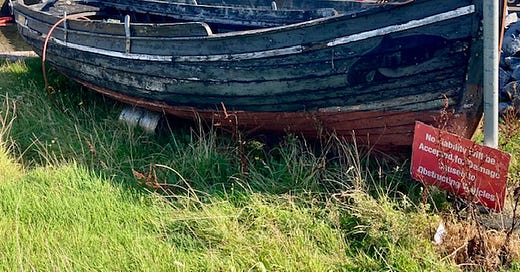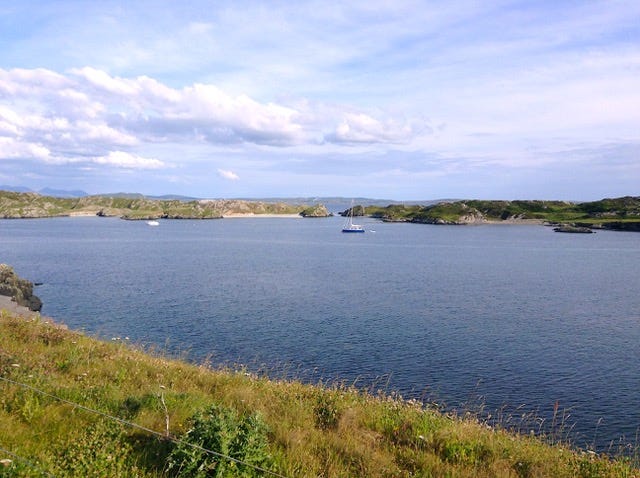The helicopter buzzed over my cottage, flying low, the noise so loud that I stopped my work and glanced out the window toward the Atlantic Ocean, the waves, a steady green unwrinkled blanket rolling out to Inishbofin Island, Ireland. The helicopter blades whirled and twirled through the bright blue Connemara sky, droning south toward Omey Island on the other side of the peninsula.
Five minutes later a plane flew over with the word RESCUE painted on its side. Still, I wasn’t lulled out of my peaceful morning writing at the dining room table. I was listening for the ring of the phone. The day before I’d blown a tire on my bicycle on a ride back from Omey Island. The bike shop in Clifden said they’d have it fixed the next day, and I was patiently waiting for them to call, hoping to take off again in the afternoon on another trip across the strand.
I had come to Ireland for this extended visit because I could feel the pull of the diaspora against the push of late middle age. I had hoped to connect with the cousins who still grazed sheep on the family farm, but above all, I had come to experience the spirit of the place—the landscape, flora and fauna, the culture and backstory to my own existence.
I had travelled to Ireland several times in the past, had hitchhiked throughout the whole country as a youth, my tattered yellow backpack thrown over my shoulder. But I was ever the visitor, the tourist, the Yank running to catch the next train or the plane back home. I wanted to get off the road and sink down into this place, into whatever sentiments and secrets I would find here. I wanted to come face-to-face with the fierce wind, the fierce ties that knit together these interrelated, joyful, grief-stricken families surrounding me, the ghosts of a political and religious past that severed those ties, forcing my grandfather and three siblings to set off for America on the waters of an unbound future.
A mile of wildness unfolded in front of me, tangles of fuchsia bushes lining the small, black-topped road leading to Rossadillisk. From the dining room window I’d watched mink jump out of the fencerow and scurry away over the granite rock, seemingly oblivious to the thorns on the blackberry vines spreading out over the landscape.
The helicopter circled overhead again. Happy, the landlady’s border collie, rose from her warm spot near the turf fire and stretched, her powerful hind legs straightening, her nails digging into the red, woolen rug. Then the dog ran to the back door and pawed to get out when she spotted Barry, the landlord, at the door.
“Two fishermen have gone missing,” Barry said. “They’re searching for the bodies now.”
Barry explained that someone had spotted an empty currach washed up on the rocks on Omey Island. A rescue crew had been called in, and all in Claddaghduff were anxiously awaiting the results, and all in Claddaghduff knew that neither man could have survived. Traditionally, few men in Connemara know how to swim, fewer still wear life jackets. The wind is so strong, the sea is so wild and rough that swimming would do little to save your life. It’s better to go down fast without struggle, the fishermen reason.
I thought of Richard Murphy’s The Cleggan Disaster, his long poem that captured the 1927 drowning of 45 fishermen from Inishbofin Island and the village of Rossadillisk.
The wind began to play, like country fiddlers
In a crowded room, with nailed boots stamping
On the stone cottage floor, raising white ashes.
So the wait began. Through lunchtime and on into early afternoon. Even though I did not know the fishermen, I could imagine the head count in the village, the determination of the names of the missing, the slow flash of denial through the minds of their loved ones, then the yearning, the desperate hoping that somehow, somehow their men would still be found alive. Out the window, the sea was now placid. Not a wave, not a spray of foam threatened the view. Shortly after one o’clock, the owner of the bicycle shop called.
“My son won’t be able to fix your bicycle right now,” Mrs. Mannion said. “It may be a few days yet. “ She explained that her son doubled as both the local bicycle repairman and the undertaker. The bike would have to wait.
Twice the lightning blinked, then a crash of thunder,
Three cliffs of waves collasped above them, seas
Crushed in his face, he fell down, and was dazed.
Around three o’clock, Geraldine, the landlady, stopped by. “They’ve found one body, and they are still searching for the other,” she said. She hoped that they would indeed find the second body. “It’s so hard for the family,” Geraldine said, “when they have no remains.”
Only one body was got, the skull fractured:
Above high-water mark he had crawled and died.
The walking-stick of a man who was lame
Was thrown in a heap of rods on a silver strand.
For the next two hours, the helicopter and the airplane made continual passes over the house. Cars sped by on the road.
At five o’clock, the noise from the helicopter and the airplane stopped. Geraldine swept by the house again.
“They’ve found the other body,” she said. “They’re taking them both to Galway now for autopsies. ‘Tis a real tragedy. One drowned fisherman has already lost a brother. The other fisherman has lost three brothers to the sea.”
The funeral boats brought over the bodies found,
But most were carried away on the great ebb-tide.
From the village of Rossadillisk they lost sixteen
And from Bofin nine. One man above all was blind.
The houses of the drowned Claddaghduff men were just behind my cottage. I imagined their wives, having identified the bodies, walking slowly back from the pier. Yes, those were their clothes. Yes, those were their men, the fathers of their children. The women stood on the edge of the ocean, on the western most tip of Europe, and watched their loved ones loaded into the helicopter to make the trip to Galway City. Pulled from the depths of the sea, their bodies were now lifted up, up, up, into the sky. I heard the prayers, the cries of lamentation they must have uttered to each other on their sad shuffle home. And just when they wanted to sink their heads into their hands at their kitchen tables, their children gathered around them, presences who do not allow a parent the luxury of collapse.
That night Sweeney’s Pub was filled with men from the village. The tables by windows were full of fishermen, drinking pints of Guinness and quietly staring out at the sea. The stools circling the bar were filled with men pretending to watch the soccer game on the large flat-screened T.V. The booths in the back of the room were filled with men pretending to watch a game show from a second television hanging down from the ceiling. At nine o’clock, the bartender turned both televisions to the news.
“I don’t want to watch the news tonight,” a man in a booth said. He stood up and walked out of the pub.
The rest of the men watched the broadcast, the announcer piecing together the little bits of information that were then known. The fishermen had left Aughrus Point in a currach sometime in the early morning to check their lobster traps. By all reports the sea was calm. Then around eleven o’clock someone sighted their boat hung up on the shore of “Omney Island.” The announcer mispronounced the word and the whole room groaned. After an extensive search, both bodies were found. The men were neighbors, not father and son.
But what took the two men down? No one knew. They could only guess. Perhaps a swell came up and blew the currach into the rocks. Perhaps the currach flipped over. When you check lobster pots, one man must stand in the currach and pull up the ropes. The other has the tricky task of keeping the boat from tipping. It’s not a job for the inexperienced and the younger man was inexperienced. But surely the older man. Surely, surely. At least they weren’t father and son.
“If a father and son are in a boat in this bay,” my neighbor Hugh told me. “One won’t save the other. Remember, neither can swim, so if one jumped in after the other, they would both drown. And they think it’s better to have at least one breadwinner in a family. And the people here have a very superstitious relationship to the sea. If you go overboard, they won’t pull you out, even if you aren’t related. They’re fearful of the sea coming back after you. They have a saying An Ze a Caileas an Farrize Geoblas. That translates literally, A person that the sea loses it will take, or more fluently, what you take from the sea, the sea takes from you. “
This essay was originally published in a slightly different form in Thinking Continental: Writing the Planet One Place at a Time, by Susan Naramore Maher, Tom Lynch, et al.
Have you read the Iowa Writiers Collaborative Sunday Round-Up or the Wednesday Flipside? Great writing here from dedicated and talented journalists.








So much loss. Such a powerful witness that the sea is the source of life and death for so many. Thanks for sharing.
Powerful story well told Mary!